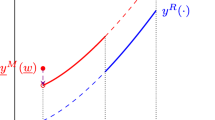Abstract
This paper identifies a family of scoring rules that are robust against coalitional manipulations that result in inefficient outcomes. We discuss the robustness of a number of Condorcet consistent and “point runoff” voting rules against such inefficient manipulation and classify voting rules according to their potential vulnerability to inefficient manipulation.
Similar content being viewed by others
References
Baharad E, Nitzan S (2005) The inverse plurality rule—an axiomatization. Soc Choice Welfare 25(1):173–178
Black D (1958) The theory of committees and elections. Cambridge University Press, Cambridge
Brams SJ, Fishburn PC (1978) Approval voting. Am Polit Sci Rev 72:831–847
Ching S (1996) A simple characterization of plurality rule. J Econ Theory 71:298–302
Fishburn PC (1973) The theory of social choice. Princeton University Press, Princeton
Fishburn PC (1974a) Paradoxes of voting. Am Polit Sci Rev 68:537–546
Fishburn PC (1974b) On the sum-of-ranks winner when losers are removed. Discret Math 8:25–30
Fishburn PC (1977) Condorcet social choice functions. SIAM J Appl Math 33:469–489
Fishburn PC (1978) Axioms for approval voting: direct proof. J Econ Theory 19:180–185
Fishburn PC (1984) Discrete mathematics in voting and group choice. SIAM J Algebr Discret Meth 5:263–275
Gehrlein WV (2002) Condorcet’s paradox and the likelihood of its occurrence. Theory Decis 52:171–199
Gehrlein WV, Fishburn PC (1976) Condorcet’s paradox and anonymous preference profiles. Public Choice 26:1–18
Kuga K, Nagatani H (1974) Voter antagonism and the paradox of voting. Econometrica 42:1045–1067
Lepelley D, Mbih B (1994) The vulnerability of four social choice functions to coalitional manipulation of preferences. Soc Choice Welfare 11:253–265
Lepelley D, Valognes F (2003) Voting rules, manipulability and social homogeneity. Public Choice 116:165–184
Moulin H (1988) Axioms of cooperative decision making, Econometric Society Monographs. Cambridge University Press, Cambridge
Nitzan S (1985) The vulnerability of point-scoring schemes to preference variation and strategic manipulation. Public Choice 47:349–370
Nitzan S, Paroush J, Lampert S (1980) Preference expression and misrepresentation in point voting schemes. Public Choice 35:421–436
Nurmi H (1999) Voting paradoxes and how to deal with them. Springer, Berlin Heidelberg New York
Richelson JT (1978) A characterization result for the plurality rule. J Econ Theory 19:548–550
Richelson JT (1980) Running off empty: run-off point systems. Public Choice 35:457–468
Riker WH (1982) Liberalism against populism: a confrontation between the Theory of Democracy and the Theory of Social Choice. Freeman, San Francisco
Saari DG (1990a) Susceptibility to manipulation. Public Choice 64:21–41
Saari DG (1990b) The Borda dictionary. Soc Choice Welfare 7:279–317
Saari DG (1994) Geometry of voting. Springer, Berlin Heidelberg New York
Saari DG (2000) Mathematical structure of voting paradoxes II: positional voting. Econ Theory 15:55–102
Smith DA (1999) Manipulability measures of common social choice functions. Soc Choice Welfare 16:639–661
Smith JH (1973) Aggregation of preferences with variable electorate. Econometrica 6:1027–1041
Young HP (1974) An axiomatization of Borda’s rule. J Econ Theory 9:43–52
Author information
Authors and Affiliations
Corresponding author
Rights and permissions
About this article
Cite this article
Baharad, E., Neeman, Z. Robustness against inefficient manipulation. Soc Choice Welfare 29, 55–67 (2007). https://doi.org/10.1007/s00355-006-0197-9
Received:
Accepted:
Published:
Issue Date:
DOI: https://doi.org/10.1007/s00355-006-0197-9




